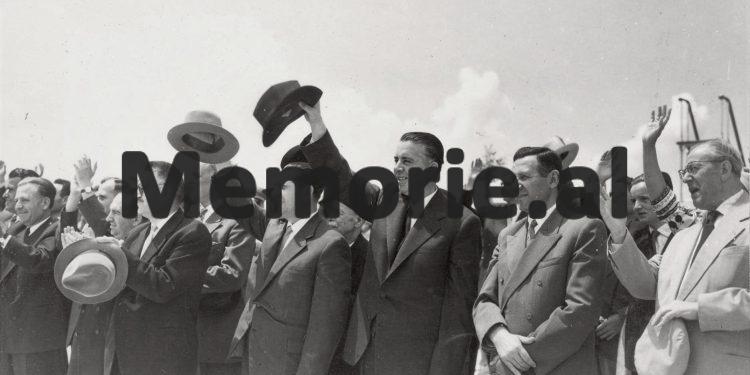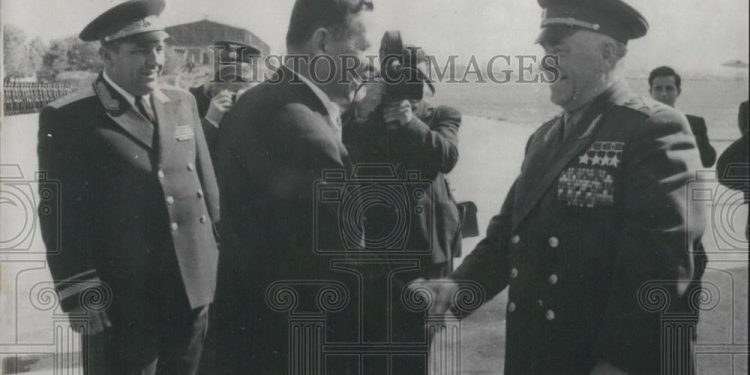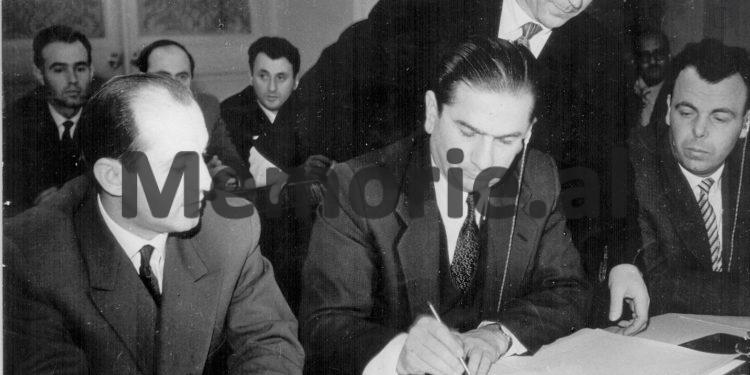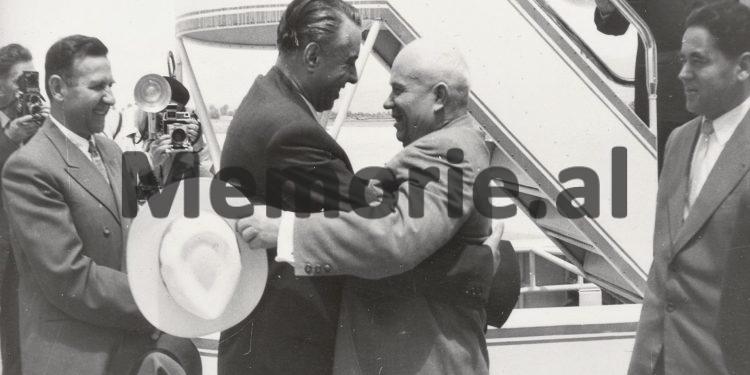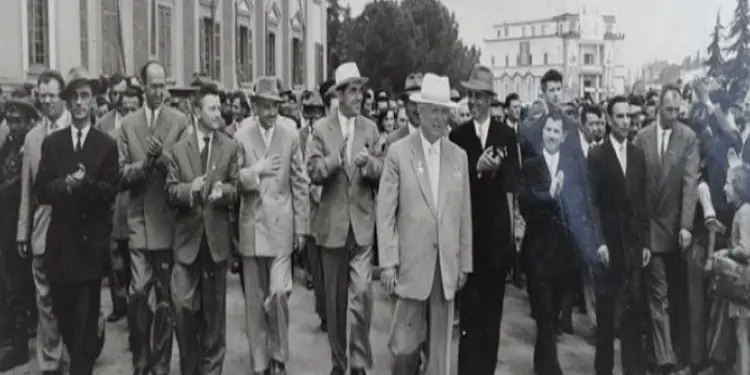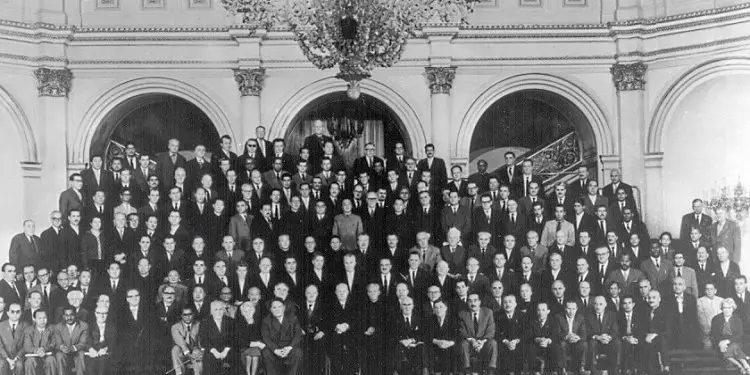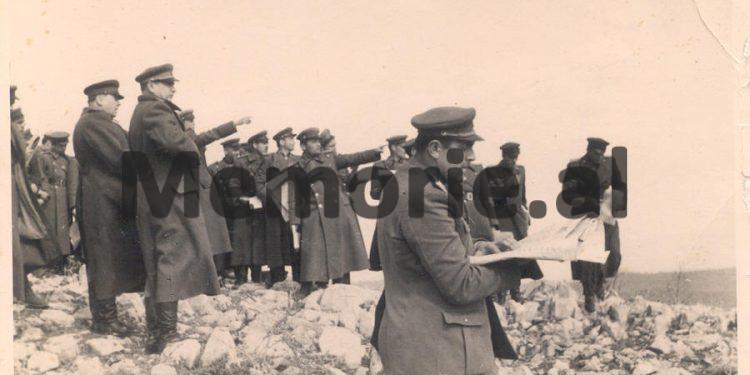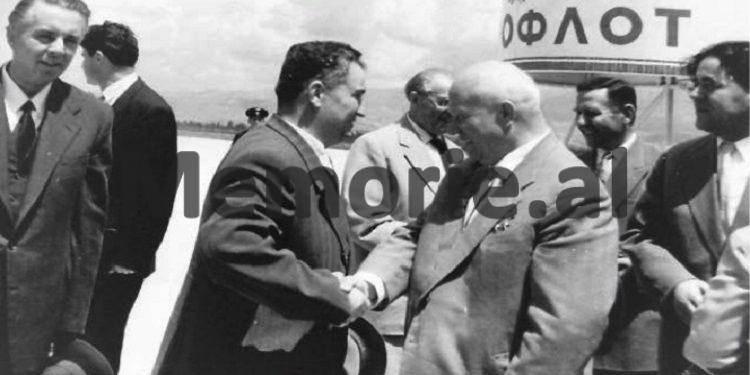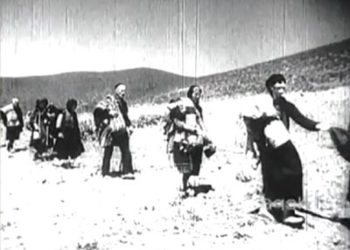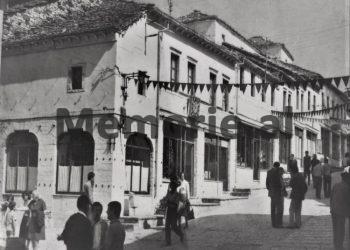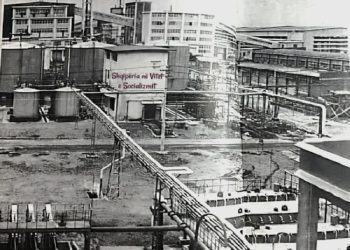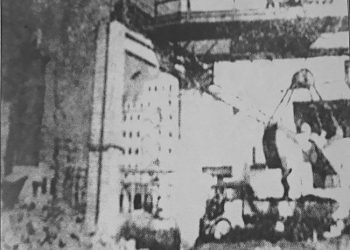By Ferdinand Dervish
Second part
-Russian archives, the plan for the invasion of Albania by the Soviets, in August 1962, is revealed-
Memorie.al / How many things remain unknown! How many things time successfully buries for decades! In June 1961, the Soviets withdrew submarines and ships from the military base of Vlora, but they could no longer gather their wits. They see themselves lost, feel irritated, unappreciated and finally put down the plan of conquering Albania. A military plan of invasion, with attack by sea and land. An invasion that had to be carried out before September 1, 1962. A plan that was rejected not only by Romania, but also by Josip Broz Tito, in the moments of the coronation. But fortunately, even a plan remained on paper, due to the missile crisis in Cuba, a commitment that seems to have nullified the plan for the invasion of the disobedient Albanian state. These “jewels” are kept in the secret archives of the army of the former Soviet Union.
Continues from last issue
Enveri – Zhukovit: In Vlora, the Soviet defense line
In the talks about the construction of the Vlora military base, Enver Hoxha has shown himself to be very optimistic. The Minister of Defense of the Soviet Union, Marshal G. K. Zhukov, who visited Albania in October 1957, in his telegram sent to the Central Committee of the Communist Party of the Soviet Union (25.10.1957), wrote that Enveri had this enthusiastic reaction in the negotiations for base of Vlora: “We would like today, here, in this narrow circle, on behalf of the Central Committee of the Party of Work of Albania and the government, to make the proposals for the Military-Naval Base in Vlora.
We appreciate that the Mediterranean Sea has a great value in terms of the strategic point of view of our socialist camp, because the Sixth American Fleet and other important forces of the NATO countries operate in it, which are definitely directed against the Soviet Union and our socialist camp. Albania, being part of the social camp, is located on the shores of the Adriatic and this is of great importance. Starting from here, the Central Committee of the Labor Party of Albania, asks the Central Committee of the Communist Party of the Soviet Union, and the Soviet Government, to turn the base of Vlora into the most powerful military-naval base for actions to the NATO naval forces in the Mediterranean.
We think that the first line of defense of Odesa and Sevastopol should be built here, here, on the Adriatic coast. A positive decision, for the return of the base of Vlora, to a powerful military-naval base, is the dream of our Albanian people and is to be awaited with enthusiasm. For all practical matters related to this proposal, we will agree in advance. We beg you, Comrade Zhukov, to send this request of ours to the attention of the Central Committee of the Communist Party of the Union of Soviet Socialist Republics. A favorable decision on this issue will have a positive impact on our relations with Yugoslavia, which should then take Albania into consideration.”
Soviet archives: Albanians tried to take all 12 submarines!
“In Moscow, Hoxha and Mehmet Shehu, the head of the Albanian Government, gave fiery anti-Khrushchev speeches. They were attacked by the leader of the Polish communists, Gomulka, who struck the anti-Marxist core of the Albanian leaders. Immediately after him, other leaders appeared in defense of Khrushchev, so Hoxha and Shehu, without waiting for the end of the meeting, traveled to Tirana. They never set foot in Moscow again. When there were invitations, they sent the secretary for ideology, Ramiz Alia. In the summer of 1961, after seeing the leader of the Albanian delegation, Ramiz Alia, in the line of guests, Khrushchev, who was not distinguished for eloquence, addressed him loudly: “Soon, Comrade Enver Hoxha, will send to your country, the trousers “.
From that day on, not even the secretary for ideology started coming to meetings. But despite the disagreements between the leaders of the Soviet Union and Albania, those between the sailors in 1960, continued to remain good. As Rear Admiral Zagrebi remembers, throughout the year 1960, our soldiers, mainly sailors, worked with the Albanians very friendly and there was no conflict. The port of Durrës was expanded; military facilities were completed, for the support of ships and anti-landing defense of the coast. At the end of 1960, the Soviet Navy gave the Albanians, according to the agreement, four submarines, “C-241”, “C-242”, “C-358” and “C-360” as well as the floating base “Vladimir Nemčinov”. “.
The leaders of the Albanian fleet and the officers of the Headquarters of the Armed Forces of Albania took part in the handover ceremony in the Bay of Vlora, bringing with it an unusual triumph. But even after the submarines were given, according to the request of the Albanians, our officers and commanders continued to teach the Albanians and go out to sea with them. Diving and maneuvering of submarines was carried out under the full supervision and control of our specialists. Meanwhile, 17 units of coastal missiles were expected to be installed in Albania, but the interruption of political relations interrupted everything.
Plenum of division
The situation worsened when from February 13 to 20, 1961, the Plenum of the Central Committee of the PPS was held in Tirana. His decisions at this time remained unknown to our sailors, but the essence was learned anyway. The Minister of Defense, Beqir Balluku, arrived in Vlora and held a closed meeting of the active party of the Albanian Navy. Our sailors had many friends among their Albanian colleagues and among the officers, and it was soon learned that Balluku, in this meeting, had cursed Khrushchev and the Soviet leadership, accusing them of revisionism, lack of desire to help Albania, and similar things.
He had given tasks to cut off any kind of relations with the Soviet instructors, to keep them away from the submarines that had already been given to the Albanians, to cut off any kind of contact with the crew of the Soviet ships. In addition to these, Balluku had requested that our ships not be allowed to leave the Pasha-Limani Base, and had even given an order to use the batteries of coastal cannons to achieve this. The situation started to become catastrophic. The attempt to mitigate this situation through the intervention of the Warsaw Treaty proved even more fatal and led to the acceleration of the final division, as the Albanians feared the armed intervention of the Soviet Union in the countries of popular democracies.
At the meeting of the countries participating in the Warsaw Pact, in March 1961, Marshal Greçko insisted that the base of Vlora pass indisputably under the command of the forces of the Warsaw Pact. But the Albanians rejected this request, even though this decision had been made to other member countries in the meantime. At the same time, the Deputy Minister of Foreign Affairs, N. P. Firjubin, the Deputy Chief of the General Staff of the Soviet Army, Army General A. I. Antonov and the Deputy Commander of the Central Staff of the Navy, Admiral N. D. Sergeev, went to Tirana at the same time. Their goal was to come to an agreement with the Albanians, so that the Vlora base would be subject to the command of the Warsaw Pact forces.
But the Albanians stood their ground, explaining that they are not subject to the decisions of the Warsaw Pact command. Without achieving anything in his goals, Firjubini turned back, together with his generals. Circumstances worsened when, by the decision of General-Colonel A. M. Adrejev, who headed the group of our advisors in Albania, the evacuation of our officers’ families to the Soviet Union began. At the same time, it was most necessary to resolve the issue of the 40th Brigade of our ships deployed in Albania, as the Albanian leaders began to present their rights over the other eight submarines, even over the entire structure of the base, together with the aids. To solve the problems that arose, they sent the former commander of unit 40, against Admiral C. G. Jegorov. But his appearance was received very badly by the Albanians.
Enver Hoxha, in his memoirs, presents it as a poison factory: “Soviet revisionists also sent a rear admiral to Tirana. The whole group consisted of Intelligence officers, sent to us to organize riots, sabotage and diversionary activities at the Vlora base”. And all of Yegorov’s hostile activity was summed up in the fact that he had to lead the operation of returning eight of our submarines to their base in the Baltic. The Albanians always and more often began to resort to threats to use force, in the first half of May 1961. Thus, at the moment when the Soviet transport ship “Čiaturi” entered the bay of Vlora, cannons were fired at it and inspected by the Albanian side.
The commander of the Black Sea Fleet is sent to Vlora
The incidents became frequent and at the end of May 1961, the commander of the Black Sea Fleet, Admiral V. A. Kasatonov, received the order to go to Vlora, to organize the extraction from Albania of the submarines and our floating base. He left Sevastopol with the cruiser “Mikhail Kutuzov”, accompanied by two torpedo boats and the tanker “Golden Horn”. As he passed through the Bosphorus, Kasatonov was telegraphed with new orders, saying that he should return the ships to base, except for the tanker. Because Albania had ordered the ban on the entry of our ships into their territorial waters.
So Kasatonov was forced to fly to Albania from Moscow, while a group of Fleet officers continued their journey with the “Golden Horn”. By the time the tanker arrived at the Vlora base, Kasatonov had also arrived. After arriving in Vlora, Kasatonov raised his flag on the floating base “Viktor Kotelnikov” and immediately called a meeting against Admiral A. V. Zagreb, Yegorov, Captain of the First Rank, P. P. Kulika, – the advisor to the head of the Albanian Fleet Staff, the commanders of the floating base and submarines, ship advisors and instructors, etc.
The commander ordered to immediately start the preparation for the departure to Sevastopol and to the Baltic. He paid special attention to the preparation for the departure, preventing the Albanians from laying hands on our ships of the auxiliary fleet, tankers, tankers, etc. The floating base “Kotelnikov” was ordered to stay at anchor in the bay of Vlora, while the eight submarines were caught on its sides. Kasatonov sent Zagrebini to Tirana to approve the relocation plan to Soviet ambassador I. V. Shikin and to General A. M. Andrejev.
The plan received their full approval. A. M. Andrejev and A. V. Zagrebin visited the Albanian Minister of Defense, Beqir Balluku, and informed him of the decision of the Soviet Government to send the ships to the Soviet Union. But it was not possible to inform the commander of the Albanian Fleet, even though Kasatonovi preferred to do it personally. To the request for a meeting with Admiral Teme Sejko, the Albanians replied that it was impossible, as the admiral was busy. But it soon became clear that Sejko had been arrested, along with a group of Navy officers. He was accused of conspiracy to overthrow the political leadership of Albania. Sejko was shot.
Leaving
Under the barrel of the cannons that we had given them and the threat of the eventual placement of mines, the 8 submarines and the floating base “Viktor Kotelnikov” left the bay of Vlora. At the head, in a warship, came the deputy commander Kozllov, in order to find out if the strait between the island of Sazan and the peninsula of Karaburun was free. After exploring, the movement and the rest of the range began. On June 8, 1961, after having fulfilled the mission entrusted to him, Vladimir Afanasevich Kasatonov left Albania, sailing with the tanker “Golden Horn”.
In the Black Sea, he went to the cruiser “Kubishev”, where he was warmly received by V. V. Mihailin. Vladimir Afanasjevic told him that the Albanians did not have the courage to use force, however they had prepared for it. As Mihailin remembers: the commander looked very tired, although he did not give himself up. He ordered a warm shower, a glass of vodka and ordered not to wake him until they arrived in Sevastopol, where S. G. Gorshkov was waiting for him. Together, they had to draft a report for the leadership and elaborate requests for further action.
May 16, 1961
At the Fourth Congress of the Party of Labor of Albania, it was declared that a conspiracy led by the commander of the Fleet, Captain First Rank, Teme Sejko, had been discovered. At this time, the leaders of the states participating in the Warsaw Treaty declared their intention; “to send to Albania a commission of Warsaw Treaty specialists to verify the allegations of conspiracy”. But the reaction of the Albanian Government was harsh: no commission, no contact. All this ultimately led to the inevitable breakdown. At the XXII Congress of the Communist Party of the Soviet Union, Khrushchev publicly attacked the Labor Party of Albania, accusing it of hostility towards the Soviet Communist Party. In December 1961, Albania severed diplomatic relations with the Soviet Union.
Ramiz Alia, how did they compare it to Enver’s pants?!
The former First Secretary of the Labor Party and at the same time the former president of the country, Ramiz Alia, during an interview, has confessed an unusual clash with Nikita Khrushchev, the head of the Soviet Communists. The event took place in the hall of a meeting of the heads of states of the so-called “people’s democracies”, held in Moscow, in the middle of 1961, which would have at its center the construction of the Berlin Wall. According to Ali’s confession, Khrushchev was irritated when he saw her in the seats reserved for Enver Hoxha, the head of the Albanian Labor Party and the head of the Government, Mehmet Shehu.
Arguing that the Albanian delegation did not have the right status, Khrushchev attacked Ramiz Ali with harsh words, and this became the reason for not starting the talks. Even Khrushchev and the others leave to another environment, waiting for the Albanian delegation to leave the hall altogether. This is the story, but the most famous joke from it, taken from the mouth of Nikita Khrushchev, has remained unknown to Albanians even though it circulated in the political circles of the time and was printed in the print media. Even Alia himself, during his interview, did not mention it, perhaps because Khrushchev’s joke in his address is very offensive.
This is how Mihail Yakovlevich, one of Khrushchev’s translators, describes that situation. “…in this meeting the First Secretary of PPSh, Enver Hoxha, was invited. This one, it seems, was afraid of criticism, instead of him he had sent the substitute to this meeting. But Khrushchev opened the meeting with the question about the status of the Albanian delegation. The fight started. Khrushchev proposed that the delegation be considered unauthorized, to decide on various issues, because it was a meeting of first secretaries and not a friendly meeting. On their part, the representatives of Albania declared that they had the right power and official authorization of their leadership to solve all the issues that would be raised in this meeting.
Khrushchev answered clearly that he was not at all satisfied with Enver Hoxha’s position, as he literally: “today he can send his substitutes, tomorrow he can send his driver, and the day after tomorrow he will hang our pants on our backs the chair”. After these words, Hikita Khrushchev suggested the Albanian delegation to leave the meeting hall. But they ignored him. Khrushchev called a break, everyone left. Only the Albanian delegation remained. The lights went out, the cleaners arrived, but the representatives of Albania remained in their seats. So Khrushchev and the others had to gather in a nearby hall. Anyway, at this point, the Albanians abandoned the meeting”. Memorie.al




